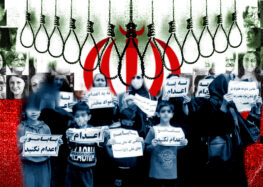Shirin Ebadi Says Deaths of Political Prisoners is Systematic
 In an interview with the International Campaign for Human Rights in Iran, Noble Peace Prize Laureate Shirin Ebadi discussed the hunger strike embarked on by 12 political prisoners in protest of the death of Hoda Saber. Ebadi told the Campaign that the deaths of Iranian political prisoners is systematic, and that the Iranian government has caused the deaths of many political prisoners over the years. “The demands of the hunger strikers are logical and yet simple demands–to identify and hold accountable the individual who caused Hoda Saber’s death. The individual is known and some political prisoners testify that he even told them his name. Also, [they demand that] those who caused the death of Haleh Sahabi must be arrested and tried in a fair trial, where people are allowed to be present, so that the facts are known. These are their demands. Delivering these demands are the Islamic Republic’s responsibility on principle,” Ebadi said.
In an interview with the International Campaign for Human Rights in Iran, Noble Peace Prize Laureate Shirin Ebadi discussed the hunger strike embarked on by 12 political prisoners in protest of the death of Hoda Saber. Ebadi told the Campaign that the deaths of Iranian political prisoners is systematic, and that the Iranian government has caused the deaths of many political prisoners over the years. “The demands of the hunger strikers are logical and yet simple demands–to identify and hold accountable the individual who caused Hoda Saber’s death. The individual is known and some political prisoners testify that he even told them his name. Also, [they demand that] those who caused the death of Haleh Sahabi must be arrested and tried in a fair trial, where people are allowed to be present, so that the facts are known. These are their demands. Delivering these demands are the Islamic Republic’s responsibility on principle,” Ebadi said.
Last Saturday, 12 political prisoners signed a statement and began a hunger strike to protest the death of Haleh Sahabi and Hoda Saber, and also what they referred to as “the memory of those killed in the Green Movement.” Saber, who was on a hunger strike to protest the death of Sahabi last week, was beaten despite his heart condition and died due to lack of medical attention.
“According to law, prison authorities are responsible for the life and health of each prisoner. Unfortunately, this responsibility was not carried out in the case of Hoda Saber. According to the testimony of several of his cellmates who witnessed the event, while sick, Hoda went to the prison infirmary. Instead of being treated though, he was beaten despite having a heart condition, to the point where he got angry. The prison staff returned him from the infirmary to his cell without any treatment, while he was shouting ‘I will file a complaint against you.’ After a short while, his condition deteriorated to the point where he lost his balance and fell down. He was moved to the hospital on a stretcher with some delay, but it was too late,” Ebadi told the Campaign.
The prisoners on hunger strike are the following individuals currently inside the political prisoners Ward 350 of Evin Prison: Ghorban Behzadian Nejad (advisor for Mir Hossein Mousavi); Bahman Ahmadi Amouee (journalist); Hassan Asadi Zeidabadi (of Daftar Tahkim-e Vahdat Alumni Association’s Central Council); Abdollah Momeni (of Daftar Tahkim-e Vahdat Alumni Association’s Central Council); Emad Behavar (head of the Freedom Movement’s Youth Branch); Amir Khosrow Dalirsani (nationalist-religious activist); Abolfazl Ghadyani (of the Islamic Revolution Organization’s Mojahedin); Feyzollah Arab Sorkhi (of the Islamic Revolution Organization’s Mojahedin); Mohammad Javad Mozaffar (publisher and Deputy Chairman of the Committee for Defense of Political Prisoners in Iran); Mohammad Reza Moghisseh (journalist and member of the Mousavi/Karroubi post-election fact-finding committee); Mohammad Davari (Chief Editor of Saham News); and Mehdi Eghbal.
“The sum of elements indicate that the Iranian government does not wish to be accountable, and I must point out that, unfortunately, several other political prisoners have also died in the past. I remind you of the deaths of Mr. Manouchehr Mohammadi and Mr. Omid Reza Mirsayafi, a blogger who had only asked Mr. Khamenei whether with all the privileges he extended to the Palestinian and Lebanese youth, he could not extend the same privileges to him [as a young Iranian] who was unemployed for a while and faced financial problems. This is why he was imprisoned and some time, died in prison. Put more accurately, he died as a result of the authorities’ negligence. Let us also remember the story of a young physician, Zahra Baniyaghoub, who was arrested by the Morality Police in a park in Hamadan. It was announced two days later that she hanged herself inside the prison. I was her lawyer and the issue of suicide was not valid in her case at all. This was staged in order to cover up her murder,” said Ebadi.
“All these elements indicate that over the years, the regime has attempted to end the lives of political prisoners. I mean when a political prisoner is not willing to surrender, interview and deliver fake confessions, they try in different ways to break them and one of these ways is through physical abuse, which in some cases has led to death, as it happened in the case of Hoda Saber. “What happens in Iran is in fact systematic and not mere negligence. It is not just carried out by a few low-level prison guards, because if these were the acts of low-level guards, then at least after the first and second cases, the Islamic Republic would have ordered an investigation and punished the offenders. But we have seen that no one has been convicted. I will remind you here of the individuals who were murdered at the hands of regime executioners at Kahrizak. These indicate a systematic and organized effort to destroy political prisoners,” Ebadi concluded.






